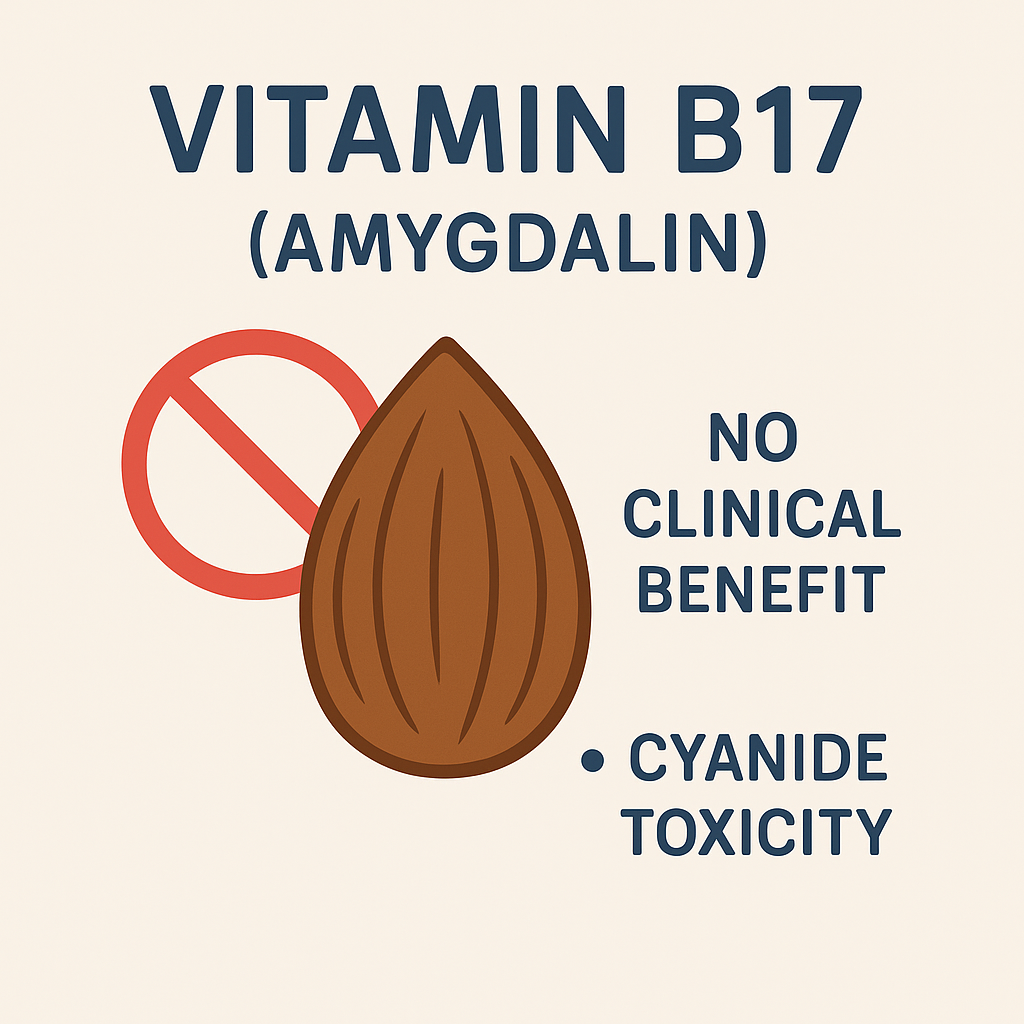
The Myth of Vitamin B17: Why This Supplement Doesn’t Deliver What It Promises
Share
In the ever-growing world of dietary supplements, certain compounds ride waves of popularity without ever proving their worth. One of the most notorious examples is Vitamin B17, also known as Laetrile or amygdalin. Marketed as a natural cancer cure, this supplement continues to be sold and consumed despite decades of scientific evidence showing no benefit—and even potential harm.
So, what exactly is Vitamin B17, and why is it considered one of the least effective and most misleading supplements?
1. What is Vitamin B17?
Despite the name, Vitamin B17 is not actually a vitamin. It’s a naturally occurring compound found in bitter almonds, apricot kernels, apple seeds, and some other plants. It was labeled “Vitamin B17” by its proponents in the 1950s to make it sound essential and medicinal. However, it is not recognized as a vitamin by any regulatory or scientific authority.
The synthetic form, Laetrile, was promoted as an alternative cancer therapy, particularly in the United States and Mexico. Proponents claimed it could target and destroy cancer cells while leaving healthy cells intact.
2. Scientific Evidence: Ineffective and Dangerous
Multiple well-designed studies and reviews have found no clinical evidence supporting the use of amygdalin or Laetrile for cancer treatment—or any health benefit, for that matter.
A systematic review published in the Cochrane Database of Systematic Reviews (Milazzo et al., 2015) concluded:
“There is no reliable evidence that Laetrile or amygdalin is effective in treating cancer in humans.”
Even worse, amygdalin releases cyanide when metabolized in the human body. According to the Journal of the American Medical Association (Moertel et al., 1982), patients who consumed Laetrile not only failed to show cancer improvement but also experienced serious side effects like cyanide poisoning, nausea, headaches, and nerve damage.
3. Why Is It Still Being Sold?
Despite the scientific consensus, B17 products continue to be sold online under the guise of “natural health.” The appeal of alternative treatments and mistrust in conventional medicine fuels ongoing demand, especially in countries where supplement regulation is loose.
Moreover, some companies use anecdotal testimonials and pseudoscientific language to market Laetrile. These tactics have been widely condemned by the FDA and cancer research organizations.
4. The Risk of Misguided Trust
Taking an ineffective supplement like B17 is more than just a waste of money—it can lead to delayed medical care. Many individuals who opt for Laetrile instead of chemotherapy or surgery end up facing worsened health outcomes.
A review published in Cancer Treatment Reviews (Ernst, 2006) warned that reliance on unproven treatments like Laetrile often results in avoidable disease progression and psychological harm when promised results fail to materialize.
5. Better Alternatives Exist
Rather than chasing miracle cures, individuals seeking to prevent or manage cancer should focus on:
-
A nutrient-rich diet high in fruits and vegetables
-
Physical activity
-
Proven supplements like Omega-3 or Vitamin D (when deficient)
-
Evidence-based medicine
If you’re ever unsure about a supplement’s safety or efficacy, check if it has been studied in peer-reviewed clinical trials—and talk to your doctor.
Final Thoughts
Vitamin B17 is a cautionary tale in the supplement world. It shows how marketing can outpace science and how "natural" does not always mean "safe." The next time you see a supplement boasting miracle cures, take a pause and check the facts.
Science saves lives. Pseudoscience can risk them.
